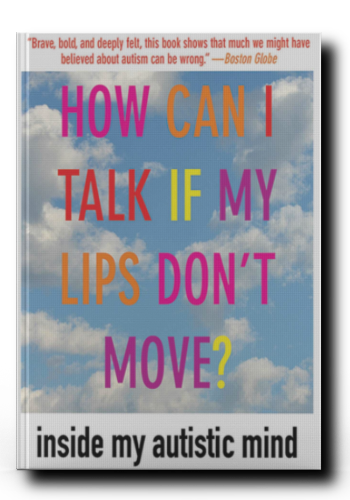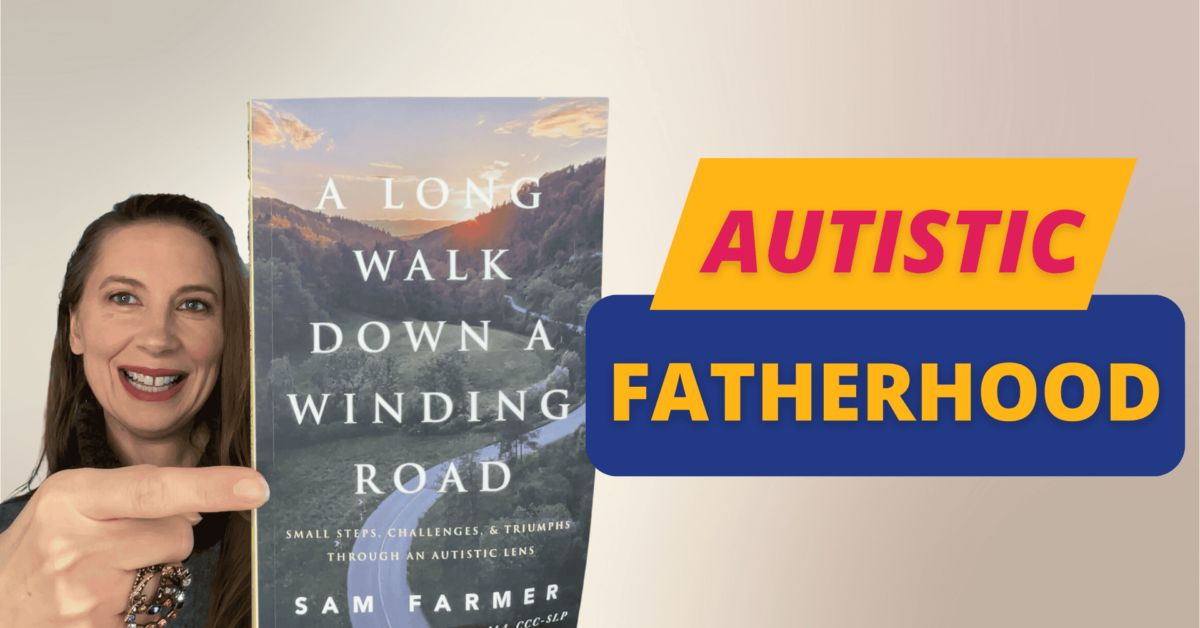“How can I talk if my lips don’t move?”
Let’s find out…
This is a book written by someone with autism who does not speak.
Tito, the author, was diagnosed as severely autistic, but his mother, Soma, was determined that he would overcome the problem by teaching him to read and write. And this is a great book about Tito’s thoughts on the entire situation.
So let’s get into what Tito has to say a little bit.
How Can I Talk If My Lips Don’t Move?
Inside My Autistic Mind
The Assessment Test
I’m sure you’re very familiar with the different assessments when your child is in a room, they’re asked to do different tasks, and let’s just say it’s stressful. Right. So he writes about that situation and it was about sorting. So he was being asked to sort. And so he writes “A new task of sorting needed to be thought, planned and acted according to the plan. The task of sorting out the blocks was very different from the passive interactions with colors and shadows within my mind.”
“It required using my body in the right way, using the right organs of my body, and picking the right object by eliminating other distractions. It was embarrassing for me if I did not get it right. No one wants to do something and then realize they did it wrong. However, it is better to be wrong at home than in front of one of those clinical psychologists who assess your intelligence not by what you think, but by what you can do.”
So stressful, right? We’ve all been there and you can hear Tito explaining he wants to do it, he has like a plan, he knows what to do, and then his body just basically fails in doing it and he feels embarrassed. He understands when he didn’t get something right and he wants to get it right and he knows what is right. But it’s like from the mind to the action, things just don’t happen the way he wants them to.
The Rage Attacks
This is a great story. I’m sure sometimes your child does certain things at school and you’re just like, “Oh, my God! What are you doing?”
So this is Tito’s story of something that happened to him at school.
“I must admit that I cannot draw beyond stick figures. Every time I tried drawing something, I would get so embarrassed I had no mental model or map in my mind and did not really know what I was drawing. And when teachers tried to be dishonest about it by praising me with a good job, I was more humiliated.“
“Do they not know that I have two books published and one translated into German? Why didn’t I tell them? The answer is not simple. I wish I could initiate my wishes more than I could initiate my impulses. I wish I could write and communicate in every circumstance, no matter what it is. But if I could do all that, I certainly would have something other than autism.”
“After hearing that annoying sing-song ‘Good job!’, I had a sudden gush of anger. I grabbed my own shirt by the collar and ripped off all my buttons. My aide Arnold had to staple them back on for the rest of the day. I had more rage attacks in school and my shirts had the same destiny.”
“I had one just before entering the classroom, I was standing at the head of the queue of students who were all waiting to enter the classroom. The moment I opened the door, there was a most annoying cause of ‘Good job!’, not only from the teacher, but from those half-educated teachers assistants who don’t even know who Byron or Shelley was, and who believe that every act of a student needed to be amended by a ‘Good job!’.”
“Why is it such a good job about opening a door? I wanted to scream at them, but wanting it is different from making it happen. So my next shirt buttons got ripped out early that morning. Arnold had to staple up this shirt too. It was a favorite shirt of mine and because it was one of my favorite shirts, mother had to stitch back the buttons that evening. For a few months, mother had to stitch back many more buttons until she got tired. ‘Sorry, you have to wear just t-shirts now. I can’t be stitching every day after coming back from work.’ Mother said.”
Oh my goodness. Right? So much of that is probably resonating with you.
Playing With Kids
Now this is about playing with other children. So Tito writes,
“I heard doctors and psychologists ask mother whether or not I played with other children my age. It made me wonder, too. They said that autistic individuals have trouble playing with other children.”
“Perhaps I thought I could play with another boy if I got good at handling a ball. We began at the small therapy park. The ball was the size of an infant’s head. When I did not have a therapy session, we worked with the ball. Every time I held it in my hands, it was as if I was holding the head of an infant. I was not to get distracted with the thought of an infant because my mother would throw it towards me, expecting me to catch it. So I needed to be alert.”
“In the beginning, they would stand very close to me so that they could drop the ball into my outstretched hands, which were ready to catch it. And I believed that I was actually catching the ball. That belief made me very proud of my ability and that belief kept me very motivated.” Yes, Tito!
“I looked forward to the ball playtime with mother. I held the ball and beheld it as the infant’s head. I felt the pride of perhaps a parent holding an infant. I felt all-powerful with my pride. Sometimes I thought that the son was also like a ball. It was waiting to drop into my outstretched hands. I held the ball and did not know what to do with it. I stood with it, not knowing how to throw it back, although I could hear them encouraging me to do so. I would walk towards whoever asked me to throw the ball and placed it in his or her hands.”
“I needed to learn how to throw a ball. One day Mother got me to stand close to her with the ball so that we could pass it back and forth between us. Slowly and very gradually, Mother began to distance herself from me, still continuing to pass the ball. To my surprise, I was actually able to throw it back to her where I stood.”
Oh goodness! So much of that part of the book is so great, right? Pride, motivation, beliefs.
A parent that just doesn’t give up. IT’S JUST SO GREAT!
Tito had that desire. He wanted to play with other kids. He wanted to learn. So he had that motivation and then he had that determination. And then he started getting more and more proud of himself and his ability. And his mom did not give up. And it can just snowball in such a good direction.
So if you’re wondering if your child has those interests, those desires to play with other people and to go out and do fun things – YES!
Just many times they don’t have that ability *yet*.
Jigsaw Puzzles
All right. This part is about the boy who does not talk but solves jigsaw puzzles. So Tito liked to solve jigsaw puzzles, and he says here…
“They could comfort me, they could relax my senses because I was sure what to do with them. I knew which piece to look for and which piece would go where. I knew that sometimes people watched me. They watched me flap my hands while I looked at my shadow. They watched me walking up and down the street screaming because the street looks strangely indifferent to me, they watched me do my jigsaw puzzles if they happened to visit my parents for a chat over cups of tea. I never looked at their faces, but I knew that they had their curious eyes on me.”
“I knew people watched me work those 20 piece and 30 piece puzzles and wonder whether or not I was really smart. Some said that I was smart, while others said that I was smart and spoilt. Only spoilt children can scream and draw so much attention. And if he is really smart, why doesn’t he talk?”
“The next door neighbor promised to ask her niece, who was studying psychology in some college, as soon as she knew she would let my parents know about that budding psychologists opinion of me.”
“Once people saw me work with the jigsaw puzzles, they no longer thought that I was mentally retarded. I liked the idea of not being called mentally retarded anymore. I soon became famous in that small township as the boy who does not talk but can solve jigsaw puzzles.”
That just goes to show you your child is listening. Your child understands when someone doesn’t believe in them and your child is smart.
The Dictations
And this last section is about writing down dictated words. So Tito goes on to talk a little bit about how he had a problem with dictation. So he had no problem writing words that he thought about on his own. But when he had to write a word that was said, then that’s when there were some problems.
He goes on to say, “I could write the word house when it originated in my mind, but I could not picture that word when someone asked me to write it. When given the letter board back, though, I could spell it very well because the letters were right in front of my eyes and I needed no extra effort to bring them forth from memory.”
“Some people who saw their children pointing and spelling may wonder why should anyone be worried about this problem? Wasn’t pointing and spelling on the letter, board or keyboard enough? I was worried about my problem. Why couldn’t I get the picture of the word house when someone asked me to write it down? I was lucky enough to have such an observant Speech Therapist. Not only was he observant, he was also ambitious about my progress…” Yaay!
“…and I am glad that mother and he worked together towards my new goal, writing words, then writing down dictated sentences. There are certain things that can puzzle people who are dealing with autism. My state still puzzles me. Why would it not puzzle others?”
Conclusion
This is a really great book that gives awesome insight into what it’s like to have autism but not be able to speak. And it really sheds a lot of light on how much thought your child has, regardless of their ability to speak.
Sometimes someone can speak and have autism, but yet still not do certain things. They still have emotions about that. They still have feelings about that. They still have opinions and desires and they want to be motivated to do certain things.
So I really recommend this book because it gives such great insight and I think it will strengthen your belief in what’s possible for your child.
I already know, you know, tons more is possible for your child. I know that’s why you’re reading this blog. Maybe it’s been a tough day or maybe you just stumbled upon this video.
I don’t know for for some reason, but keep going.
If you need motivation, check out this book and really get to know how much more can happen for your child based on the words of another who’s lived it.





